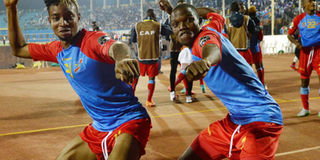Rwanda 2016 could be turning point for Chan

Striker Jonathan Bolingi ( L) was instrumental in DRC's CHAN success.
What you need to know:
SOCCER. There is no denying that the African Nations Championship has reached its hinge point
KAMPALA.
When African football body, Caf, announced the birth of the Africa Nations Championship (Chan) on September 11, 2007, they must have felt proud.
Often criticised for being inward looking and largely inactive, Caf had spent time to invent something, a competition for exclusively home-based players.
So what’s the catch with that? Barely anything as the first edition rolled into Ivory Coast, two years after the announcement.
Perhaps fearful of what reception it would find or even an overkill of sorts, only eight teams, having braved regional qualifiers, made it to final tournament.
Caf wanted to keep it a smaller affair in order not to create an event that would compete with the cherished Africa Cup of Nations (Afcon).
Early struggles
The biennial event struggled for attention even as the number of teams doubled for the 2011 edition in Sudan where Tunisia dethroned DR Congo.
No amount of cosmetics, organic or not, was going to make the less beautiful sister of the Afcon appear prettier.
As changes were made to the Afcon to shift from even years to odd years, the Chan ‘paid the price’ as the 2013 event was not held till 2014 in South Africa.
South Africa were only lifesavers due to the war in the initial host country, Libya, in the aftermath of the ouster of Col. Muammar Gaddafi. An unstable Libya mirrored an uncertain Chan.
Perhaps the 2014 edition was the biggest low – almost all stadiums were empty and the locals had no clue it was happening in their backyard. Caf desperately needed something drastic to resuscitate it.
The prize money was raised and Rwanda got the rights to host the 2016 edition, which ended last Sunday.
As DR Congo clinched their second title, most of Africa wore a smile of satisfaction. There has been unrelenting praise for the hosts doing a brilliant job.
The four stadiums looked meticulous on television and with the exception of the single glitch of a power outage, once, it was a flawless showpiece.
Even during the heavy rain as DR Congo battered Mali 3-0 in the final, the Amahoro Stadium pitch didn’t disintegrate.
The other infrastructure like hotels and roads bore no blame as Rwanda put on a show hoping for a springboard to the tourism sector in the long term.
Rwandan positives
Two decades ago, one of Africa’s worst stories was happening as about a million people were killed in the 1994 genocide that engulfed Rwanda.
Perhaps, even more impressive was the number of fans who came out to watch the games. It felt good unlike South Africa 2014 where games seemed to be taking place in the wilderness.
Even if the opening day brought only one goal in Rwanda’s 1-0 win over Ivory Coast as Gabon and Morocco drew goalless, it did not dampen the spirit.
It immediately sprung to life on Day Two as DR Congo spanked Ethiopia 3-0 to send a loud warning signal as favourites.
Goals became the norm as the 16 teams shared 80 goals in 32 games at an average decent return of 2.5 goals per game.
The quality of some of those were for the collectors’ eclipsed by Yao Serge N’Guessan’s strike from beyond the halfway line for the Ivorians against Cameroon in the quarterfinals.
Even as Uganda Cranes exited at the group stage and contributed only three goals to the total, many here enjoyed the tournament thoroughly.
Going forward
This feeling must have echoed in many countries save for those who still do not rate it like Egypt, Sudan and South Africa, who fielded weakened sides in the qualifiers.
It is unimaginable for a moment when Chan is more popular than the Afcon, especially with the influx of European football on our television, but Caf will know they are now on the hinge.
If football remains the universal sport and we love our buffet, there is little wrong in cheering Yaya Toure and Elia Meschak, scorer of a blinder of a goal in the final.
THE GOALS
I. Coast 2009: 30 goals in 16 matches
Sudan 2011: 59 goals in 32 matches
S. Africa 2014: 73 goals in 32 matches
Rwanda 2016: 80 goals in 32 matches
CHAN 2016 IN RWANDA
FINAL
DR Congo 3-0 Mali
TOP SCORERS
4 goals: Elia Meschak (DRC), Chisom
Chikatara (Nigeria), Ahmed Akaïchi(Tunisia)
3 goals: Jonathan Bolingi (DRC), Ernest
Sugira (Rwanda)
2 goals: Saad Bguir (Tunisia), Abdelghani
Mouaoui (Morocco), Alseny Kamara
(Guinea), Ary Papel (Angola), Yazid Emane
Atouba(Cameroon)




